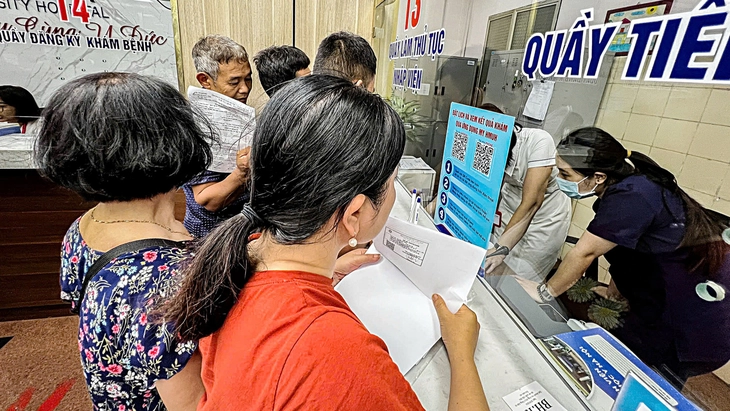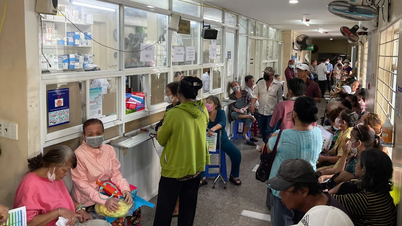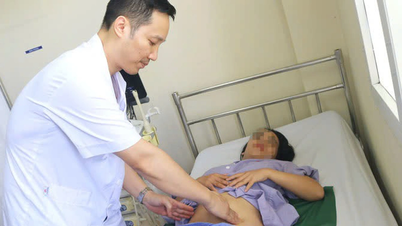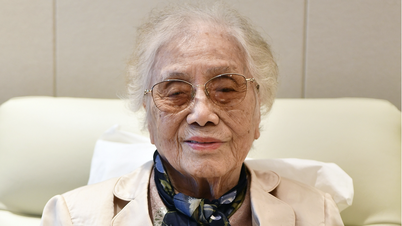
People get health insurance medicine at Hanoi Medical University Hospital - Illustration photo: NAM TRAN
However, long-term medication also has many potential risks that patients need to be aware of.
Not everyone gets the maximum 90-day supply of medication.
The Ministry of Health has just issued Circular 16 regulating prescriptions and the prescription of pharmaceutical and biological drugs in outpatient treatment at medical examination and treatment facilities.
Accordingly, the circular promulgates a list of diseases and groups of diseases that are applied to outpatient prescriptions for more than 30 days, including 252 diseases and groups of diseases. For diseases in this list, the prescriber decides the number of days of use of each drug in the prescription, based on the clinical condition and stability of the patient to prescribe the drug with the maximum number of days of use of each drug not exceeding 90 days.
However, the maximum 90-day prescription does not apply to all patients in this list. When drafting the circular and the list, Mr. Vuong Anh Duong, Deputy Director of the Department of Medical Examination and Treatment Management, Ministry of Health, noted that extending the prescription period is a very careful matter, because the highest goal is to ensure the health and safety of patients.
"Not every disease on the list is prescribed for 90 days by default. The doctor will have to base on each patient's specific condition to decide how many days to prescribe.
The new circular also stipulates that prescribers must base on the diagnosis and condition of the patient to decide the quantity of medicine prescribed, the number of days of use of each medicine in the prescription and be responsible for their decisions. The number of days of medicine supply depending on each disease code will range from 30 to 90 days," Mr. Duong said, emphasizing that people should not misunderstand that being on the list means being given long-term medicine by default.
Each physician is responsible for each prescription and must anticipate possible risks during the patient's treatment at home.
Doctor be careful, patient be careful
Sharing about this issue, Dr. Nguyen Quang Bay, head of the endocrinology department of Bach Mai Hospital, said that the group of chronic diseases is characterized by the elderly, dependent people, low income; people with many comorbidities, taking many medications, and limited mobility.
"Prescribing for more than 30 days helps reduce the number of times and time patients and their families go to the hospital or clinic; saves on travel and food costs along the way; limits sources of infection at hospitals or on public transport; and limits the impact of environmental pollution and bad weather. A stable prescription that is not changed for at least 2-3 months will increase treatment compliance," said Dr. Bay.
Mr. Vuong Anh Duong noted that to ensure patient safety, doctors still need to ensure safe treatment principles, avoid drug abuse or let patients experience complications that are not detected promptly.
People also need to be instructed by doctors to self-monitor and detect early side effects of drugs (if any) and need to monitor their health and take medication as directed so that the disease does not become serious.
According to Dr. Bay, there are some points that doctors are a little concerned about in managing patients who are prescribed long-term medication. First, those who are given long-term medication may have a subjective mentality of thinking that their illness is stable, so they do not monitor their condition (such as measuring blood sugar, blood pressure), do not exercise daily, eat irregularly, especially take medication irregularly, or even stop taking medication.
Due to lack of regular health education and consultation; lack of medical examination, patients easily miss serious symptoms; forget to return for check-ups, leading to running out of medicine. People with many chronic diseases, treated at different hospitals/specialties, may have some medicine still available but some medicine may run out.
"Therefore, to effectively implement this, medical facilities must prepare enough medicine to provide to patients, possibly 2-3 times more than usual. Along with that, there must be human resources to serve, coordinate medical examination and medicine distribution. At the same time, it is necessary to ensure a smooth information technology system, connecting the clinic - medicine warehouse - medicine distribution point and pharmacy; a system of signs, patient instructions.
Doctors at the examination department must carefully study the list of diseases, discuss thoroughly with patients and their families to see which specific cases can be prescribed for 30, 60 or 90 days. In addition, the examining doctor needs to schedule a detailed appointment for the date and time of the follow-up visit, instruct the patient to go to the examination on time; provide hotline numbers, Zalo numbers... for patients to contact when they have questions or health abnormalities," Dr. Bay advised.
Doctor Bay added that chronic disease means a long-term illness, stability is only temporary, people with chronic diseases are often elderly, have many diseases... so to maintain a stable condition, good health, it is necessary to read the prescription carefully before leaving the hospital, if there is anything you do not understand, you need to discuss immediately with the examining doctor or pharmacist who dispenses the medicine.
In particular, you should immediately contact your doctor or the hospital hotline when you have unusual signs of health or when you have another disease. You can go for a follow-up examination immediately without waiting for the full 60 or 90 days of your appointment; proactively make an appointment 3-5 days in advance via the hospital's hotline or medical examination app.
Cancer patients need to be careful
Doctor Pham Cam Phuong, director of the Nuclear Medicine and Oncology Center, Bach Mai Hospital, said that for cancer patients, once they have achieved stable treatment results and only need periodic check-ups to check for recurrence or metastasis, they will be given regular medication.
Currently, the policy of providing medicine for a maximum of 3 months is applied to 3 groups of diseases: thyroid cancer, breast cancer and non-small cell lung cancer. It is important to note that patients must be in a stable treatment condition to be provided with medicine in a 3-month cycle and not more than 90 days.
"However, we emphasize that cancer still has the risk of progressing, recurring or metastasizing at any time. Therefore, if during the period of taking regular medication, the patient experiences unusual symptoms such as cough, chest pain, discomfort... then they need to go to the doctor soon, and should not wait until the scheduled follow-up appointment to return to the hospital," Dr. Phuong emphasized.
Source: https://tuoitre.vn/ke-don-thuoc-man-tinh-toi-da-90-ngay-benh-nhan-can-luu-y-gi-20250706233204438.htm



![[Photo] Brilliant red of the exhibition 95 years of the Party Flag lighting the way before the opening](https://vphoto.vietnam.vn/thumb/1200x675/vietnam/resource/IMAGE/2025/8/27/e19d957d17f649648ca14ce6cc4d8dd4)
![[Photo] Prime Minister Pham Minh Chinh receives CEO of Samsung Electronics](https://vphoto.vietnam.vn/thumb/1200x675/vietnam/resource/IMAGE/2025/8/26/373f5db99f704e6eb1321c787485c3c2)
![[Photo] Prime Minister Pham Minh Chinh chairs meeting of National Steering Committee on International Integration](https://vphoto.vietnam.vn/thumb/1200x675/vietnam/resource/IMAGE/2025/8/26/9d34a506f9fb42ac90a48179fc89abb3)





























































































Comment (0)